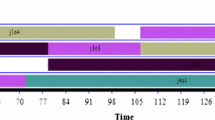Abstract
This paper presents a solution algorithm for a single machine scheduling problem with two criteria: total tardiness and total flow time. Theoretical results of precedence properties which are respected by all nondominated schedules are first derived. These precedence properties are then incorporated into a multiple-criteria dynamic programming framework to improve the computational efficiency. Results of the computational experiment and the average behavior (computation time and efficiency) of the algorithm are reported.
Similar content being viewed by others
References
Baker, K. R.,Introduction to Sequencing and Scheduling, John Wiley and Sons, New York, New York, 1974.
Baker, K. R., andSchrage, L. E.,Finding an Optimal Sequence by Dynamic Programming: An Extension to Precedence-Related Tasks, Operations Research, Vol. 26, No. 1, 1978.
Conway, R. W., Maxwell, W. L., andMiller, L. W.,Theory of Scheduling, Addison-Wesley Publishing Company, Reading, Massachusetts, 1967.
Emmons, H.,One-Machine Sequencing to Minimize Certain Functions of Job Tardiness, Operations Research, Vol. 17, No. 4, 1969.
Sen, T. T., andAustin, L. M.,An Efficient Algorithm for Minimizing Total Tardiness in the N-Job, One-Machine Sequencing Problem, Texas Tech University, College of Business Administration, Working Paper, 1980.
Srinivasan, V.,A Hybrid Algorithm for the One-Machine Sequencing Problem to Minimize Total Tardiness, Naval Research Logistic Quarterly, Vol. 18, No. 3, 1971.
Yu, P. L., andZeleny, M.,The Set of All Nondominated Solutions in Linear Case and a Multiple Criteria Simplex Method, Journal of Mathematical Analysis and Applications, Vol. 49, No. 2, 1975.
Yu, P. L.,Cone Convexity, Cone Extreme Points, and Nondominated Solutions in Decision Problems with Multiobjectives, Journal of Optimization Theory and Applications, Vol. 14, No. 3, 1974.
Steuer, R. E.,ADBASE: An Adjacent Efficient Basis Algorithm for Solving Vector-Maximum and Interval Weighted-Sums Linear Programming Problem, Journal of Marketing Research, Vol. 12, pp. 454–455, 1975.
Ziont, S., andWallenius, J.,An Interactive Programming Method for Solving the Multiple Criteria Problem, Management Science, Vol. 22, No. 6, 1976.
Zeleny, M.,Linear Multiobjective Programming, Springer-Verlag, New York, New York, 1974.
Lawler, E. L.,Combinatorial Optimization: Networks and Matroids, Holt, Rinehart, and Winston, New York, New York, 1976.
Garey, M. R., andJohnson, D. S.,Computers and Intractability, Freeman, San Francisco, California, 1979.
Held, M., andKarp, R. M.,A Dynamic Programming Approach to Sequencing Problems, SIAM Journal on Applied Mathematics, Vol. 10, No. 1, 1962.
Schrage, L., andBaker, K. R.,Dynamic Programming Solution of Sequencing Problems with Precedence Constraints, Operations Research, Vol. 26, No. 3, 1978.
Lawler, E. L.,On Scheduling Problems with Deferral Costs, Management Science, Vol. 11, pp. 280–288, 1964.
Schild, A., andFredman, I. J.,Scheduling Tasks with Deadlines and Nonlinear Loss Functions, Management Science, Vol. 9, pp. 73–81, 1962.
Krajewski, L., andBradford, J. W.,Resolving Multiple Objectives in Master Production Scheduling, Proceeding of the 9th Annual Conference of American Institute of Decision Sciences, Chicago, Illinois, 1977.
Bergstresser, K., Charnes, A., andYu, P. L.,Generalization of Domination Structures and Nondominated Solutions in Multicriteria Decision Making, Journal of Optimization Theory and Applications, Vol. 18, No. 1, 1976.
Yu, P. L.,Dynamic Programming in Finite-Stage Multicriteria Decision Problems, University of Kansas, School of Business, Working Paper Series, No. 118, 1978.
Yu, P. L., andSeiford, L.,Multistage Decision Problems with Multicriteria, Multiple Criteria Analysis: Operational Methods, Edited by P. Nijkamp and J. Spronk, Gower Publishing Company, London, England, 1981.
Baker, K. R., andMartin, J. B.,An Experimental Comparison of Solution Algorithms for the Simple Machine Tardiness Problem, Naval Research Logistic Quarterly, Vol. 21, No. 1, 1974.
Author information
Authors and Affiliations
Additional information
Communicated by P. L. Yu
This investigation was supported in part by University of Kansas General Research Allocation No. 3470-20-0038 and the University of Kansas School of Business Research Fund provided by the Fourth National Bank and Trust Company, Wichita. The ideas and opinions expressed herein are solely those of the author. The author especially wants to thank Professor P. L. Yu for valuable comments on an earlier draft of this paper.
Rights and permissions
About this article
Cite this article
Lin, K.S. Hybrid algorithm for sequencing with bicriteria. J Optim Theory Appl 39, 105–124 (1983). https://doi.org/10.1007/BF00934608
Issue Date:
DOI: https://doi.org/10.1007/BF00934608




